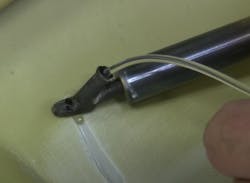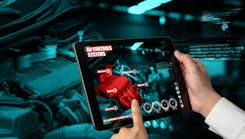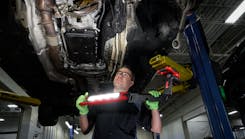Why isn't the welding rod sticking to this PUR bumper?
Question: Why isn’t the welding rod sticking to this PUR bumper?
Answer:
Bumpers made from PUR, or thermoset polyurethane, are not very common today. This was a very common material on domestic car bumpers from the ’70s through the ’90s, and there are still a few applications today, like the Dodge Challenger rear bumper. However, most plastic bumpers today are made of polypropylene (PP) blends.
Most plastics are “thermoplastic”, or meltable plastics, so technicians are more familiar with these types. Technicians are less familiar with the “thermoset” plastics, like polyurethane. These types of plastics are not meltable because they form a solid through a chemical reaction. If you try to melt the plastic, it chemically breaks it down and destroys it.
The mistake most technicians make when trying to weld a polyurethane bumper is that they try to melt the base material with the welder. This causes the base material to break down, forming a sticky liquid on the surface. The welding rod peels right off the liquid.
What’s the right way to do it? Think of a “weld” repair on a polyurethane bumper more like a braze or a hot melt glue. First of all, since it’s actually an adhesive repair, you need to prepare the surface properly by cleaning and sanding it to get some good sandscratches into the surface. Then you want to melt the thermoplastic urethane (TPU) welding rod onto the prepared surface without overheating the base material. You can do this by holding the welding tip just off the surface and use the welder more like a hot melt glue gun.
Information provided by Polyvance



